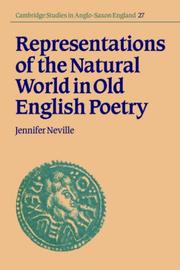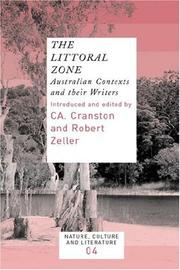| Listing 1 - 10 of 255 | << page >> |
Sort by
|
Book
ISBN: 3476009912 Year: 1994 Publisher: Stuttgart Metzler
Abstract | Keywords | Export | Availability | Bookmark
 Loading...
Loading...Choose an application
- Reference Manager
- EndNote
- RefWorks (Direct export to RefWorks)
Holderlin, Friedrich --- Nature in literature --- Nature in poetry --- Hölderlin, Friedrich,
Book
ISBN: 1421430592 1421430142 1421430991 Year: 2019 Publisher: Johns Hopkins University Press
Abstract | Keywords | Export | Availability | Bookmark
 Loading...
Loading...Choose an application
- Reference Manager
- EndNote
- RefWorks (Direct export to RefWorks)
Originally published in 1969. Alan Roper studies the degree to which Arnold achieved a unity of human significance and literal landscape. If landscape poetry is to rise above the level of what Roper calls "country contentments in verse," the poet cannot think and describe alternately; his thinking and describing must be a part of one another. That Matthew Arnold was aware of the difficulty in achieving the necessary unity becomes clear in his own criticism, which Roper examines along with a large and representative number of Arnold's poems. Considering the latter roughly in the order they were published—except for a fuller analysis of Empedocles on Etna, "The Scholar-Gipsy," and "Thyrsis"—Roper follows important changes in Arnold's view of the function and nature of poetry as it emerged in the poems themselves. Basic to the author's critical method is a distinction between geographical sites and poetic landscapes. Focusing on the ways that Arnold and, to a lesser extent, the Augustan and Romantic poets before him untied thought and description, Roper adds a critical dimension to Arnold scholarship. Concerned not with the development of Arnold's ideas nor with their sources in classical antiquity and the Romantic period, he considers Arnold a self-conscious poet who, though sometimes successful, became increasingly unsuccessful in his efforts to imbue a landscape with meaning for individual or social man.
Nature in literature. --- Arnold, Matthew, --- Criticism and interpretation. --- Nature in poetry --- Literature: history & criticism

ISBN: 1107116015 0521030536 1280161922 0511117205 0511149816 0511309856 0511483376 0511051379 0511006136 9780511006135 0511036140 9780511036149 9780511117206 9780521640367 0521640369 9780511483370 9780521030533 9781107116016 9781280161926 9780511149818 9780511309854 9780511051371 Year: 1999 Publisher: Cambridge, U.K. ; New York : Cambridge University Press,
Abstract | Keywords | Export | Availability | Bookmark
 Loading...
Loading...Choose an application
- Reference Manager
- EndNote
- RefWorks (Direct export to RefWorks)
This book examines descriptions of the natural world in a wide range of Old English poetry. Jennifer Neville describes the physical conditions experienced by the Anglo-Saxons - the animals, diseases, landscapes, seas and weather with which they had to contend. She argues that poetic descriptions of these elements were not a reflection of the existing physical conditions but a literary device used by Anglo-Saxons to define more important issues: the state of humanity, the creation and maintenance of society, the power of individuals, the relationship between God and creation and the power of writing to control information. Examples of contemporary literature in other languages are used to provide a sense of Old English poetry's particular approach, which incorporated elements from Germanic, Christian and classical sources. The result of this approach was not a consistent cosmological scheme but a rather contradictory vision which reveals much about how the Anglo-Saxons viewed themselves.
English poetry --- Nature in literature. --- Nature in poetry --- History and criticism. --- Arts and Humanities --- Literature
Book
ISBN: 1317146417 1317146409 1315578646 1409401588 9781409401582 9781472404114 1472404114 1306549949 9781306549943 140940157X 9781409401575 9781409401575 9781315578644 9781317146391 9781317146407 9781138249851 Year: 2016 Publisher: London ; New York : Routledge,
Abstract | Keywords | Export | Availability | Bookmark
 Loading...
Loading...Choose an application
- Reference Manager
- EndNote
- RefWorks (Direct export to RefWorks)
Arguing that the Bildungsroman is humanist culture's own origin story, Feder draws on the work of biologists in her examination of works by Voltaire, Mary Shelley, Virginia Woolf and Jamaica Kincaid. She dramatizes Western culture's own awareness of the instability of the binary of nature and culture, making a timely intervention in the ongoing culture-nature debate, bridging the gap between cultural theory and biologically grounded research.
Bildungsromans --- Ecology in literature. --- Nature in literature. --- Nature in poetry --- Bildungsroman --- History and criticism.

ISBN: 1282265326 9786612265327 9401204519 1435612329 9781435612327 9042022183 9789042022188 9789401204514 9042022183 9789042022188 9781282265325 6612265329 Year: 2007 Publisher: Amsterdam [Netherlands] ; New York, NY : Rodopi,
Abstract | Keywords | Export | Availability | Bookmark
 Loading...
Loading...Choose an application
- Reference Manager
- EndNote
- RefWorks (Direct export to RefWorks)
In this, the first collection of ecocritical essays devoted to Australian contexts and their writers, Australian and US scholars explore the transliteration of land and sea through the works of Australian authors and through their own experiences. The littoral zone is the starting point in this fresh approach to reading literature organised around the natural environment—rainforest, desert, mountains, coast, islands, Antarctica. There’s the beach, where sexual and spiritual crises occur; the Western Australian wheatbelt; deserts, camel trekking, and the transformation of a salt flat into an inland island; New Age literature that ‘appropriates’ Aboriginal culture as the healing poultice for an ailing West; a re-examination of pastoralism; an inquiry into whether Judith Wright's work can “persuade us to rejoice” in the world; the Limestone Plains, home of the bush capital and the bogong moth; tropical North Queensland; national parks where “the mountains meet the sea”; temperate islands, with their history of sealing, Soldier Settlement, and sea country pastoral; and Antarctica, where a utopian vision gives way to an emphasis on its ‘timeless’ icescape as minimalist backdrop for human dramas. The author-terrain includes poets, playwrights, novelists, and non-fiction writers across the range of contexts constituting the littoral zone of ‘Australia’.
Australian literature --- Nature in literature. --- Australian literature. --- Nature in poetry --- History and criticism.
Book
ISBN: 142142097X 9781421420974 9781421420967 1421420961 Year: 2016 Publisher: Baltimore : Baltimore, Md. : Johns Hopkins University Press, Project MUSE,
Abstract | Keywords | Export | Availability | Bookmark
 Loading...
Loading...Choose an application
- Reference Manager
- EndNote
- RefWorks (Direct export to RefWorks)
Ultimately, Natures in Translation demonstrates that--far from being separate from the dominant concerns of British imperial culture--nature was integrally bound up with the business of empire.
Romanticism --- Natural history in literature. --- Nature in literature. --- English literature --- Nature in poetry --- History and criticism.
Book
ISBN: 1782844295 9781782844297 9781845198886 1845198883 Year: 2017 Publisher: Brighton, [England] : Sussex Academic Press,
Abstract | Keywords | Export | Availability | Bookmark
 Loading...
Loading...Choose an application
- Reference Manager
- EndNote
- RefWorks (Direct export to RefWorks)
Chinese poetry --- Nature in literature. --- Songs, Chinese. --- Chinese songs --- Nature in poetry
Book
ISBN: 1438476809 9781438476803 9781438476797 1438476795 Year: 2019 Publisher: Albany, New York : SUNY Press,
Abstract | Keywords | Export | Availability | Bookmark
 Loading...
Loading...Choose an application
- Reference Manager
- EndNote
- RefWorks (Direct export to RefWorks)
Reconciling Nature maps the complex views of the environment that are evident in celebrated American novels written between the Centennial Celebration of 1876 and the end of the Second World War. During this period, which includes the Progressive era and the New Deal, Americans held three contradictory views of the natural world: a recognition of nature's vulnerability to the changes brought by industrialism; a fear of the power of nature to destroy human civilization; and a desire to make nature useful. Robert M. Myers argues they reconciled these conflicting views through nature nostalgia, policing of wilderness areas, and through strategies of control borrowed from the social sciences. Myers combines environmental history with original readings of eight novels, producing fresh perspectives on Mark Twain's Adventures of Huckleberry Finn, Stephen Crane's Maggie, Kate Chopin's The Awakening, Upton Sinclair's The Jungle, Mary Austin's The Ford, Theodore Dreiser's An American Tragedy, Zora Neale Hurston's Their Eyes Were Watching God, and William Faulkner's Go Down, Moses. While previous ecocritical works have focused on proto-environmentalism in classic works of literature, Reconciling Nature explores the ambivalence within these texts, demonstrating how they reproduce views of nature as threatened, threatening, and useful. The epilogue examines the environmental ideologies associated with the development and deployment of the first atomic bomb.
Nature in literature. --- American literature --- Nature in poetry --- History and criticism.
Book
ISBN: 1108654908 1108756069 1108496814 1108757855 Year: 2019 Publisher: Cambridge : Cambridge University Press,
Abstract | Keywords | Export | Availability | Bookmark
 Loading...
Loading...Choose an application
- Reference Manager
- EndNote
- RefWorks (Direct export to RefWorks)
The Concept of Nature in Early Modern English Literature traces a genealogy of ecology in seventeenth-century literature and natural philosophy through the development of the protoecological concept of 'the oeconomy of nature'. Founded in 1644 by Kenelm Digby, this concept was subsequently employed by a number of theologians, physicians, and natural philosophers to conceptualize nature as an interdependent system. Focusing on the middle decades of the seventeenth century, Peter Remien examines how Samuel Gott, Walter Charleton, Robert Boyle, Samuel Collins, and Thomas Burnet formed the oeconomy of nature. Remien also shows how literary authors Ben Jonson, George Herbert, Andrew Marvell, Margaret Cavendish, and John Milton use the discourse of oeconomy to explore the contours of humankind's relationship with the natural world. This book participates in an intellectual history of the science of ecology while prompting a re-evaluation of how we understand the relationship between literature and ecology in the early modern period.
Nature in literature. --- English literature --- Nature in poetry --- History and criticism.
Book
ISBN: 0472127403 0472038001 9780472127405 Year: 1995 Publisher: Ann Arbor, Michigan : University of Michigan Press,
Abstract | Keywords | Export | Availability | Bookmark
 Loading...
Loading...Choose an application
- Reference Manager
- EndNote
- RefWorks (Direct export to RefWorks)
Chinese poetry --- Nature in literature. --- Emotions in literature. --- History and criticism. --- Nature in poetry --- Chinese literature
| Listing 1 - 10 of 255 | << page >> |
Sort by
|

 Search
Search Feedback
Feedback About UniCat
About UniCat  Help
Help News
News